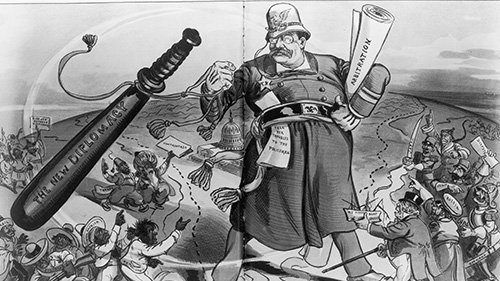Top 5 Tips to Prepare for the AP® Government Exam
It’s about that time. The Advanced Placement® Government & Politics Exam is around the corner. I’m sharing my top five tips to help you prepare...
AP & Honors Mathematics
Explore Wiley titles to support both AP and Honors mathematics instruction.
Literacy Skills & Intensive Reading
Connections: Reading – Grades 6–12
Empower student success with a proven intensive reading program that develops strong reading skills in striving readers.
Drama, Speech & Debate
Basic Drama Projects 10th Edition
Build students’ confidence and competence with comprehensive, project-based theatre instruction.
Literature
Connections: Literature
Support learners as they study dynamic, relevant texts and bring the richness of diverse voices to students through literature.
Literature & Thought
Develop critical thinking, reading, and writing across literacy themes, genres, historical eras, and current events.
Language Arts
Vocabu-Lit® – Grades 6–12
Help students build word power using high-quality contemporary and classic literature, nonfiction, essays, and more.
Connections: Writing & Language
Help students develop grammar, usage, mechanics, vocabulary, spelling, and writing and editing skills.
Reading/English Language Arts
Measuring Up to the English Language Arts Standards
Incorporate standards-driven teaching strategies to complement your ELA curriculum.
English Language Learners
Measuring Up for English Language Learners
Incorporate research-based best practices for ELLs with an approach that includes a focus on language acquisition strategies.
Mathematics
Measuring Up to the Mathematics Standards
Incorporate standards-driven teaching strategies to complement your mathematics curriculum.
Foundations
Measuring Up Foundations
Help students master foundational math skills that are critical for students to find academic success.
Science
Measuring Up to the Next Generation Science Standards
Give students comprehensive NGSS coverage while targeting instruction and providing rigorous standards practice.
Assessment
Measuring Up Live
Deliver innovative assessment and practice technology designed to offer data-driven instructional support.
For a better website experience, please confirm you are in:
3 min read
Patrick Sprinkle Apr 17, 2025 12:00:00 PM

The argumentative essay question on the AP U.S. Government and Politics exam demands a synthesis of content knowledge, analytical skill, and persuasive writing. It challenges students to construct a coherent argument, supported by evidence from foundational documents and course concepts, while acknowledging alternative perspectives. The 2021 essay question, focusing on the balance of power between the president and Congress, serves as an excellent model for dissecting the components of this challenging task.
The 2021 prompt reads:
The power of the executive branch in relation to the legislative branch has varied over time. Develop an argument that takes a position on the appropriate balance of power between the president and Congress.
Use at least one piece of evidence from one of the following foundational documents:
- Declaration of Independence
- The Federalist 51
- The Federalist 70.
In your response you should do the following:
✓ Respond to the prompt with a defensible claim or thesis that establishes a line of reasoning.
✓ Support your claim with at least TWO pieces of specific and relevant evidence.
- One piece of evidence must come from one of the foundational documents listed above.
- A second piece of evidence can come from any other foundational document not used as your first piece of evidence or it may be from your knowledge of course concepts.
✓ Use reasoning to explain why your evidence supports your claim or thesis.
✓ Respond to an opposing or alternate perspective using refutation, concession, or rebuttal.
The first crucial step is to develop a defensible claim or thesis. This thesis must clearly articulate a position on the appropriate balance of power between the president and Congress. For example, a student might argue that the president should have a stronger role in foreign policy due to the need for swift action, or alternatively, that Congress should hold greater since it reflects more diverse perspectives in a large republic. The key point is students must develop their ‘why.’ This thesis and corresponding ‘why’ serves as the guiding principle for the entire essay, shaping the selection and interpretation of evidence. Students must ensure their thesis is not merely a statement of fact but a debatable argument that can be supported with evidence.
The next component requires supporting the claim with at least two pieces of evidence. Critically, one piece of evidence must come from the provided foundational documents (Declaration of Independence, Federalist 51, or Federalist 70). In this case, students might cite Federalist 70, where Alexander Hamilton argues for a strong, unitary executive to ensure energy and efficiency in government. They could then supplement this with a course concept, such as the president's role as commander-in-chief, or another foundational document like the Constitution’s veto clause. Students must select evidence that directly relates to their thesis and demonstrates a deep understanding of the source material. Generally, each of the foundational documents will support one of the potential arguments. In this case, students will find that Federalist 70 argues for a strong President, the Declaration of Independence argues for the Congress, and Federalist 51 argues for an equal balance of power.
Equally important is the use of reasoning to explain why the evidence supports the claim. Students cannot simply drop quotes or facts into their essay; they must analyze the evidence and articulate its relevance to their argument. For instance, when using Federalist 70, students should explain how Hamilton’s emphasis on executive energy translates to a need for presidential power in contemporary policymaking. They must connect the dots between the evidence and their thesis, demonstrating a clear line of reasoning. In other words, students need to explain how the foundational document supports their claim. For example, it would not be enough to simply state how the Declaration of Independence gives credence to the idea of popular sovereignty or the will of the people.
Finally, students must respond to an opposing or alternate perspective. This demonstrates critical thinking and nuanced understanding of the issue. Students can choose to refute, concede, or rebut an alternative viewpoint. For example, if arguing for a stronger presidency, they might concede that unchecked executive power can lead to tyranny, but then rebut this by emphasizing the checks and balances inherent in the Constitution. Alternatively, they could refute the argument that Congress is better suited for swift action by citing historical examples of legislative gridlock. The easiest way for students to get this point is to develop a counterargument and be clear to concede the point.
In essence, the argumentative essay on the AP U.S. Government and Politics exam requires students to construct a compelling argument, supported by evidence and reasoned analysis, while acknowledging alternative viewpoints. By mastering these components and adopting a strategic approach, students can effectively navigate this challenging section of the exam and demonstrate their mastery of the course material.

It’s about that time. The Advanced Placement® Government & Politics Exam is around the corner. I’m sharing my top five tips to help you prepare...

Though the College Board’s AP® United States Government and Politics FRQs #3 and #4 may be more involved and seem more challenging, FRQ #1 and #2 can...

The Free-Response Question (FRQ) portion of the Advanced Placement® exam provides test takers with the opportunity to demonstrate their knowledge on...

Political cartoons have influenced the public and brought about change like other tools in the press. The historic 1754 cartoon of a sliced-up snake,...

You know the Style #4 Free Response Question on the College Board’s national Government exam can be a real challenge. I am talking about the argument...

In 2021, the College Board® added a new section to the AP® U.S Government and Politics Exam: quantitative analysis. This counts for four raw points...

Perhaps you heard of that Supreme Court decision handed down last year, where citizens and an interest group challenged a government-run World War I...

Each year after the AP® exam I ask students to evaluate my class. Last year, they overwhelmingly identified that they wanted to work on FRQs more...

One of the personal stories I frequently share with my students is how I nearly became a lawyer. I majored in political science and philosophy in...

You may have heard about the “Irish” Thesis Formula—it is all over the internet. Some teachers like it, others hate it, but whatever you think about...

Experienced AP World History teacher Dave Drzonek and AP World History Exam table leader Charlie Hart discuss what students did well and what they...

The Supreme Court question on the AP Government exam, a mandatory component, consistently challenges students to demonstrate a nuanced understanding...
